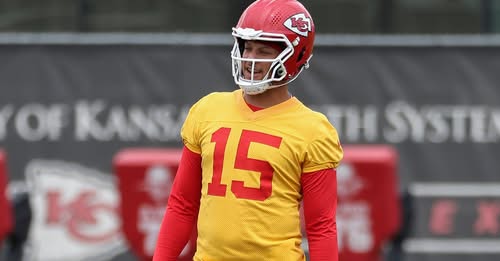**Patrick Mahomes Faces Unwarranted Criticism Over Weight from Radio Host**
Kansas City Chiefs star quarterback Patrick Mahomes, a three-time Super Bowl champion and one of the most dominant players in the NFL, recently found himself at the center of an unnecessary controversy. A radio host sparked backlash by suggesting that Mahomes appeared overweight, a comment that many fans and analysts deemed irrelevant and disrespectful given the quarterback’s unparalleled success on the field.
Mahomes, who has led the Chiefs to four Super Bowl appearances in the last five years, has consistently proven himself as one of the greatest quarterbacks of his generation. His ability to extend plays, make impossible throws, and perform under pressure has redefined the position. Yet, despite his achievements, the focus shifted momentarily from his football brilliance to an unfounded critique about his physique—a narrative that holds little weight when examining his performance and conditioning.
The criticism began when the radio host, whose comments quickly circulated on social media, questioned whether Mahomes had gained weight, implying that it might affect his play. The remarks were met with swift backlash from fans, teammates, and analysts who pointed out the absurdity of scrutinizing an athlete’s body type when his results speak for themselves. Critics argued that Mahomes’ physique has never hindered his ability to dominate the league, and his track record of durability—playing through injuries and maintaining elite production—further disproves any concerns about his conditioning.
This incident highlights a broader issue in sports media, where athletes, even those at the pinnacle of their profession, are often subjected to unnecessary and superficial critiques. Unlike sports like boxing or bodybuilding, where weight classes and muscle definition play a direct role in performance, football success is measured by on-field production, leadership, and adaptability—all areas where Mahomes excels. His unique playing style, which relies on improvisation, arm strength, and football IQ, does not conform to traditional expectations of a quarterback’s build, yet he has shattered records and redefined what’s possible at the position.
Furthermore, Mahomes has never been the prototypical “lean” quarterback. His strength and ability to shed tackles have been assets, allowing him to extend plays and deliver under pressure. Players like Ben Roethlisberger and Josh Allen have similarly thrived despite not fitting the mold of a slender pocket passer, proving that effectiveness at quarterback comes in different forms. The attempt to body-shame Mahomes reflects a shallow understanding of athletic performance, ignoring the fact that his physique contributes to his durability and playmaking ability.
Beyond the on-field implications, the criticism also raises questions about the standards to which athletes are held. In an era where mental health awareness in sports is growing, unnecessary scrutiny over appearance can contribute to undue pressure. Mahomes has always carried himself with professionalism, handling both praise and criticism with maturity. However, the fact that even a player of his caliber faces such remarks underscores how pervasive body-shaming can be in sports culture.
Teammates and coaches have consistently praised Mahomes’ work ethic and dedication. Head coach Andy Reid has often spoken about his quarterback’s relentless preparation, and teammates have highlighted his leadership in the locker room. If Mahomes’ weight were truly an issue, it would have surfaced in performance dips or conditioning concerns—neither of which have been evident. Instead, he continues to break records, win championships, and cement his legacy as one of the all-time greats.
The radio host’s comments also ignore the physical demands of playing quarterback in the NFL. Mahomes’ ability to absorb hits, evade pressure, and maintain stamina throughout grueling games speaks to his conditioning. His training regimen, which includes agility drills, strength training, and recovery work, is tailored to maximize his performance, not to fit an arbitrary aesthetic standard. Modern sports science prioritizes functionality over appearance, and Mahomes’ success is a testament to that approach.
In the larger context, this incident reflects a tendency in sports media to fixate on narratives that lack substantive relevance. Rather than discussing Mahomes’ strategic evolution, his mastery of defensive reads, or his impact on the Chiefs’ dynasty, the conversation veered toward a superficial critique. This type of commentary does a disservice to fans who appreciate the nuances of the game and the extraordinary skill required to play at Mahomes’ level.
Fortunately, the backlash to the radio host’s remarks demonstrated that most fans and analysts recognize the absurdity of the critique. Social media was flooded with support for Mahomes, with many pointing out his accomplishments and dismissing the weight-related comments as irrelevant. Former players and analysts also weighed in, emphasizing that football success is measured by wins, not waistlines.
Ultimately, Patrick Mahomes’ legacy will be defined by his championships, his highlight-reel plays, and his influence on the game—not by misguided critiques about his physique. As he continues to chase more Super Bowl titles and build his case as one of the greatest quarterbacks in history, this episode will likely be forgotten as a minor footnote in an otherwise legendary career.
The incident serves as a reminder that even the most accomplished athletes are not immune to baseless criticism. However, Mahomes’ response—or lack thereof—speaks volumes. By staying focused on his craft and letting his performance do the talking, he reinforces why he is held in such high regard. The next time a commentator feels compelled to critique him, perhaps they should focus on what truly matters: his unparalleled talent, his relentless drive, and his undeniable impact on the sport.
In the end, Patrick Mahomes doesn’t need to conform to outdated stereotypes about how a quarterback should look. He only needs to keep winning—and that’s exactly what he’s done.



